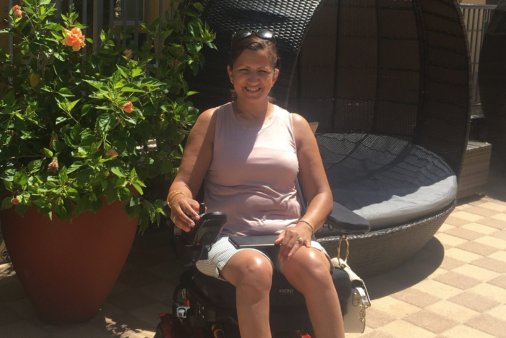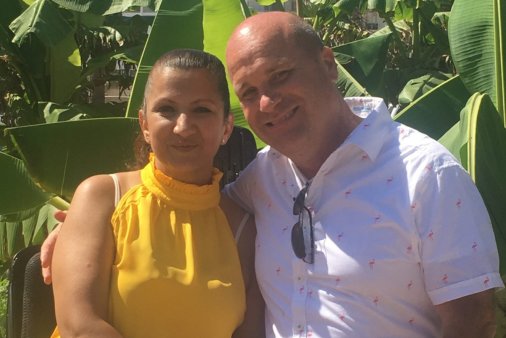When you’re new to living in a wheelchair, you may think traveling won’t be easy for you anymore. I completely understand because, after my spinal cord injury, I once worried I would never be able to take a road trip as easily as able-bodied people again. However, I was recently able to go on a fun vacation with my whole family to the beach in Texas! I’d love to share a little bit about my recent road trip with you along with my top tips for planning a wheelchair-accessible vacation.
My Top 5 Tips for a Wheelchair-Accessible Vacation on the Road
1. Research potential vacation destinations before choosing.
First, pick a few places that you want to go to. Next, narrow down the locations based on what is most realistic for you. You’ll want to make sure the place you pick is easily wheelchair accessible and offers the amenities and attractions you’d like to see.
In addition, I recommend considering the amount of time it will take to get there by car, since you may not want to be inside your accessible vehicle for very long periods of time.
For example, originally, my family and I had planned to go to Florida. Unfortunately, it would mean a drive of about sixteen hours. Also, I watched the weather and found out that Florida was due for some serious storms.
Finally, we chose to go to South Padre Island in Texas. Luckily, the drive took about four and a half hours, and it was a beautiful ride.
 Once you’ve picked out your destination, find out more about hotels, resorts, or even Air B&B options that offer wheelchair accessibility. You may also want to book in advance.
Once you’ve picked out your destination, find out more about hotels, resorts, or even Air B&B options that offer wheelchair accessibility. You may also want to book in advance.
In my case, I wanted to make sure about the parking situation at the hotel. The hotel I found had free disabled parking with plenty of parking spot options. I also needed to be certain that the hotel would have in-room and bathroom accessibility. This is because I need more room to move around in my power wheelchair than one might in a manual wheelchair. Plus, I wanted balcony access to be able to enjoy the oceanfront view with my family.
Since I have a neuromuscular condition known as Myasthenia Gravis, I also have to be careful of excessive heat and sunlight. Luckily, the hotel we chose had an outdoor shaded veranda near the swimming pool and even overlooking the beach. I was so happy to be able to enjoy the outdoors while staying protected from the sun.
2. Find out more about accessibility at local tourist spots and restaurants.
On top of researching accommodations, I suggest checking out the wheelchair accessibility of various tourist spots, local restaurants, and other places you might want to visit during your trip. Looking around online can be a huge help. Sometimes you can even find advice from locals on message boards.
I also recommend calling ahead of time if you can’t find enough helpful information online. For example, we knew we wanted to go on a boat to watch for dolphins in the gulf. The first company we called didn’t have a way of getting me on the boat. However, the second company we called was extremely helpful.
Once we got there, the boat crew was so accommodating. I was very impressed that they had a proper ADA (American Disabilities Act) approved ramp to get me on board safely.
We ended up having a great time on the boat as we watched the dolphins. We even saw a shark! I loved being able to experience this all with my husband and children.
3. Get ready for your trip by packing everything you need in advance.
If you’re disabled or in a wheelchair, chances are you might also regularly use medical supplies such as intermittent catheters, ostomy products, or even incontinence supplies.
I recommend making a list of all the things you know you need to use. Calculate how many supplies to bring along with you based on your typical usage and how long you plan to be away from home. Plan to pack enough extras for a few additional days in case of any unforeseen emergencies like car trouble or unexpected bad weather.
Thanks to using a closed system catheter kit, I am able to self-cath easily when I am seated and have privacy. Having a full supply of my closed system catheters on hand gave me peace of mind, so I was more able to enjoy the road trip as well as the time spent at our destination.
If you need help finding travel-ready supplies like pocket catheters, underpads to protect your car seats, and more, just contact the friendly specialists at 180 Medical for more information.
4. Prep your vehicle and get it ready for the road.
I suggest taking time to have your wheelchair-accessible vehicle checked at your dealer or local service center. It’s a good idea to stay on top of regular oil changes, tire pressure checks, and tire rotation as well. This could reduce the risk of car trouble while you’re on the road. Still, you always want to plan for the unexpected like flat tires or other issues. Make sure you have roadside assistance on your current auto insurance policy.
Additionally, you may want to organize your vehicle for maximum comfort during your road trip. For instance, I set up my back seat with comfortable padding, a clean towel, and an incontinence underpad (sometimes called a chuck). I was able to sit there through the entire trip while using my power chair as a leg rest. With this set-up, I was also able to shift my weight easily to avoid pressure sores. Plus, the clean towel and underpad protected me just in case I had any bladder issues or leakage during the car ride.

5. Relax and enjoy your accessible vacation.
Lastly, my advice to you would be to try to relax and just enjoy your time away from home.
I’ve learned that not everything is always going to be perfect or completely accessible. However, when you let go of what you can’t control, you can better enjoy things.
So above all, take lots of pictures. Make some amazing memories. And remember it’s okay to ask for help.
For me, traveling again after my spinal cord injury has become a wonderful way of feeling freedom again. It’s a huge boost to your morale if you’re disabled. I always seem to feel more confident when I come back home after a nice vacation away.
Best wishes for your fun wheelchair-accessible vacation ahead!
You can take a look at some of my other articles on 180 Medical’s blog here.